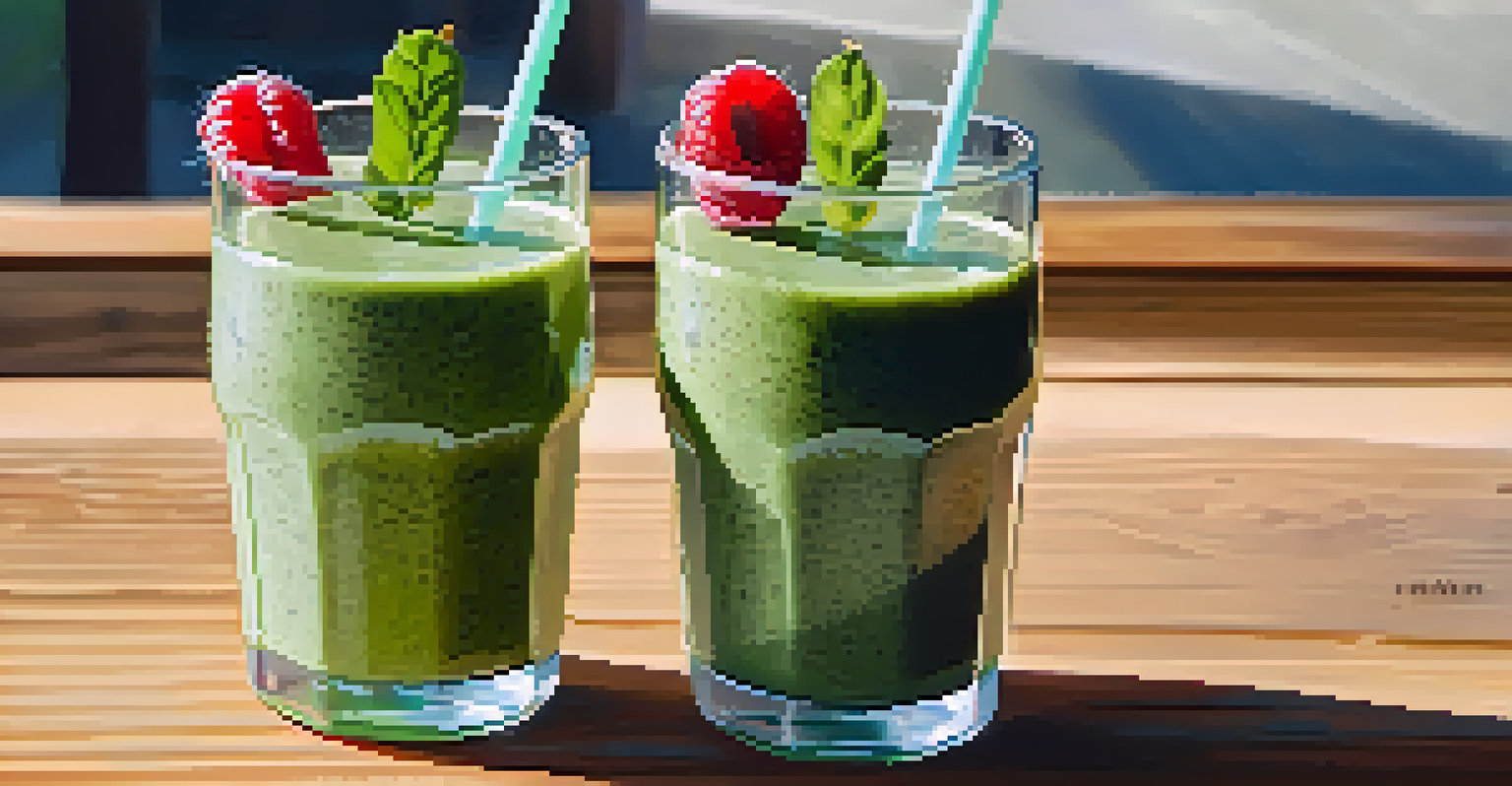How Raw Foods Support Diabetes Management and Prevention

Understanding Diabetes: A Brief Overview
Diabetes is a chronic condition that affects how your body processes glucose, a vital energy source. There are two main types: Type 1, which is often genetic, and Type 2, commonly linked to lifestyle factors. Type 2 diabetes is the more prevalent form and can often be managed through diet and exercise.
The food you eat can either be the safest and most powerful form of medicine or the slowest form of poison.
Understanding the role of blood sugar levels is crucial for managing diabetes. When you eat, your body breaks down food into glucose, which enters your bloodstream. Insulin, a hormone produced by the pancreas, helps cells absorb glucose for energy. In diabetes, this process is disrupted, leading to high blood sugar levels.
Prevention is key, especially for Type 2 diabetes. Healthy lifestyle choices, including diet, can significantly reduce the risk. This brings us to the role of raw foods, which can provide a wealth of benefits for those managing or looking to prevent diabetes.
What Are Raw Foods and Their Nutritional Benefits?
Raw foods are unprocessed, uncooked plant-based foods that retain their natural enzymes, vitamins, and minerals. This includes fruits, vegetables, nuts, seeds, and sprouted grains. These foods provide essential nutrients that can support overall health and well-being.

One of the standout benefits of raw foods is their high fiber content. Fiber plays a crucial role in stabilizing blood sugar levels and improving digestion. When you consume fiber-rich foods, they slow down the absorption of sugar into your bloodstream, preventing spikes in blood glucose.
Diabetes Management and Raw Foods
Incorporating raw foods into your diet can help stabilize blood sugar levels and support overall health for diabetes management.
Additionally, raw foods are often low in calories and high in water content, making them a great choice for weight management. Maintaining a healthy weight is vital for diabetes management, as excess weight can contribute to insulin resistance.
How Raw Foods Impact Blood Sugar Levels
Raw foods can significantly influence blood sugar levels due to their low glycemic index (GI). The glycemic index measures how quickly foods raise blood sugar levels. Foods with a low GI, like most raw fruits and vegetables, lead to gradual increases in blood sugar, making them a safe choice for diabetics.
Let food be thy medicine and medicine be thy food.
For example, consider the difference between a raw apple and a processed apple pie. The apple provides natural sugars, fiber, and nutrients, while the pie is loaded with refined sugars and fats that can cause rapid blood sugar spikes. Choosing raw foods can help maintain stable glucose levels.
Incorporating raw foods into your diet can also enhance insulin sensitivity. This means your body can use insulin more effectively, which is crucial for managing diabetes. Greater insulin sensitivity can lead to better blood sugar control and a reduced risk of complications.
Essential Raw Foods for Diabetes Management
Some raw foods are particularly beneficial for diabetes management. Leafy greens, such as spinach and kale, are low in calories and high in nutrients, making them ideal for meals and snacks. These greens also contain antioxidants that can reduce inflammation in the body.
Berries, like blueberries and strawberries, are another excellent choice. They are packed with vitamins, minerals, and antioxidants, while their low GI helps keep blood sugar levels stable. Plus, they add a delicious sweetness to your meals and snacks.
Hydration is Key for Blood Sugar
Staying hydrated with high-water-content raw foods can aid in regulating blood sugar levels and enhancing kidney function.
Nuts and seeds, such as almonds and chia seeds, are rich in healthy fats, protein, and fiber. They can curb hunger and prevent overeating, which is beneficial for maintaining a healthy weight. Including these in your diet can provide long-lasting energy without the sugar crash.
Incorporating Raw Foods into Your Diet
Transitioning to a raw food diet doesn't have to be an all-or-nothing approach. Start by incorporating more raw foods into your meals gradually. You might begin with a raw salad as a side dish or replace a cooked snack with a piece of fruit or a handful of nuts.
Consider preparing smoothies that blend raw fruits and vegetables. Smoothies are a delicious way to consume a variety of nutrients in one go. For instance, a green smoothie packed with spinach, banana, and almond milk can be both satisfying and beneficial for blood sugar control.
Experiment with raw food recipes to keep your meals exciting and enjoyable. Raw food dishes, like zoodles (zucchini noodles) or raw vegan desserts, can satisfy cravings without compromising your health goals. The key is to find what works for you and enjoy the journey.
The Role of Hydration in Diabetes Management
Staying hydrated is important for everyone, but it's particularly crucial for those managing diabetes. Proper hydration can help regulate blood sugar levels and support kidney function, which is essential for processing excess glucose. Raw foods, being high in water content, can contribute significantly to your daily fluid intake.
For instance, fruits like watermelon and cucumbers are not only refreshing but also hydrating. Including these in your diet helps you stay hydrated while providing vital nutrients. Hydration can also aid digestion and reduce the risk of complications associated with diabetes.
Consult Professionals for Guidance
Working with healthcare professionals is crucial for developing a personalized and effective dietary plan for managing diabetes.
It's essential to balance hydration with water and raw foods instead of sugary beverages, which can lead to blood sugar spikes. By prioritizing hydration through these means, you'll support your overall health and diabetes management efforts.
Consulting with Healthcare Professionals
Before making significant dietary changes, it's always a good idea to consult with healthcare professionals. A registered dietitian or a certified diabetes educator can provide personalized guidance tailored to your specific health needs. They can help you develop a plan that incorporates raw foods while considering your preferences and lifestyle.
Monitoring your blood sugar levels regularly is also essential when adjusting your diet. Keeping track of how different foods affect your glucose can empower you to make informed choices. This can be particularly helpful when introducing new raw foods into your meals.

Remember, every individual's experience with diabetes is unique, and what works for one person may not work for another. Collaborating with healthcare professionals ensures that you're making safe and effective dietary changes to support your diabetes management journey.